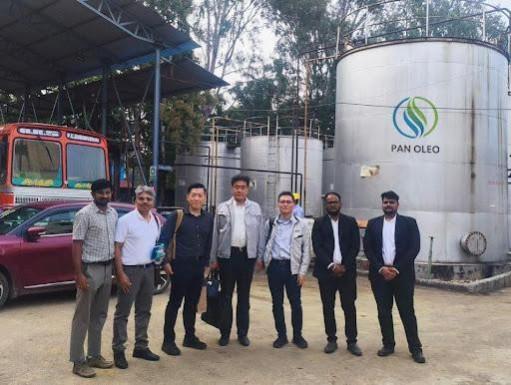
Mumbai, India: India's national attention centred almost entirely around solar energy, wind farms and electric mobility when the green energy movement accelerated during the last decade. Government bodies, global investors and think-tanks intensely monitored gigawatts installed, lithium battery breakthroughs and EV charging infrastructure. These sectors deserved the traction they received but while the world focused on electrification, another revolution was unfolding quietly and powerfully beneath the surface. It was a revolution driven not by silicon panels or batteries, but by biofuels a technology rooted in India's kitchens, farms and food ecosystem, with the power to reduce oil imports, unlock carbon neutrality and generate rural employment on a scale unmatched by any other renewable sector.
Pan Oleo Energy, today widely regarded as one of the India's fastest-rising powerhouse in waste-to-fuel innovation. Every year, India produces an estimated 3–4 million tonnes of used cooking oil (UCO), waste organic fats and oils and over 500 million tonnes of agricultural residue. Instead of being put to productive use, this immense resource has historically been treated as a burden. Agricultural residue meets a similar fate burnt openly in the fields, triggering blanket smog that forces schools and hospitals to close every winter. The scale of the oversight is immense: what India labelled as "waste" was actually a multi-billion-dollar renewable fuel reservoir hiding in plain sight. Pan Oleo Energy recognised this long before the rest of the market. "Where others saw a disposal problem, we saw an energy opportunity. Not waste. Fuel. Power. Energy independence," explains Venkateshwaran, CTO of Pan Oleo, capturing the philosophy that has shaped the company's rise.
From that realisation began a decade-defining transition. Instead of starting with refineries, Pan Oleo focused on what truly dictates the future of the biofuel sector feedstock. The company built one of India's most sophisticated feedstock procurement infrastructures, stretching across multiple states, food-industry hubs and agricultural belts. This made Pan Oleo one of the first companies in India to convert UCO and residue into a structured raw-material supply chain rather than an informal, untraceable waste stream. On this foundation, Pan Oleo scaled into an industrial renewable-fuel manufacturer with remarkable speed and precision. Today, the company operates state-of-the-art biodiesel manufacturing facilities, equipped with pollution control approvals, hazardous chemical and methanol storage licenses, multi-stage distillation systems and standardized in-house testing laboratories to ensure reliability for heavy-duty industrial applications.
But Pan Oleo's horizon extends far beyond biodiesel. As the global aviation industry undergoes its most disruptive shift since the jet engine era, the fuel that powers aircraft is entering a permanent transition. Major economies are enforcing mandatory Sustainable Aviation Fuel (SAF) adoption between 2030 and 2050, because aviation is among the most difficult sectors to electrify or decarbonise. According to the International Air Transport Association (IATA), worldwide SAF demand is expected to reach 450 billion litres by 2050, while today's production meets less than 1% of that requirement. The bottleneck limiting SAF expansion is not refinery technology but feedstock — the exact resource Pan Oleo has been consolidating at scale for years. "We are building for SAF and other futuristic fuels. Biodiesel is not our destination — it is currently our launchpad," says Vasanth JB, COO of Pan Oleo Energy, reflecting a strategy that peers in the industry are only beginning to understand.
Pan Oleo has built a model that is fiscally viable from day one. The company converts waste into fuel, the fuel reduces India's crude oil import bill, and the resulting economic savings strengthen the national energy economy. The impact is interconnected across three dimensions: economically, Pan Oleo strengthens industrial revenue and reduces dependence on foreign oil; environmentally, the company prevents toxic dumping, eliminates open-field burning and significantly lowers carbon emissions; socially, it generates rural and semi-urban livelihoods, formalises informal waste-economy labour and builds a circular supply chain that rewards participation rather than exploitation. As a Pan Oleo representative puts it, "Decarbonisation cannot depend on charity. It must be profitable to be scalable and that is the future we are engineering." For Pan Oleo, doing good for the planet and doing well financially are not contradictions they are complementary forces.
As India's green energy sector enters its fastest-growing decade with biofuels expected to evolve into a ₹1.5–2 lakh crore industry Pan Oleo Energy stands uniquely positioned to lead. Its rise has not been loud or sensational, but quiet, strategic and now impossible to ignore.

















